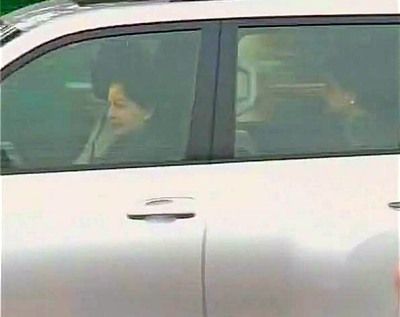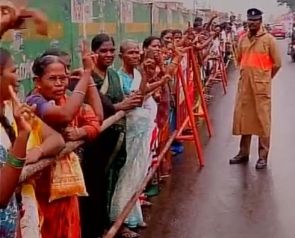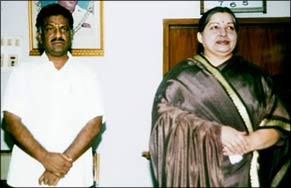While there is likely no bar on Jayalalithaa meeting with Chief Minister O Panneerselvam and his cabinet colleagues, she may not see senior government officials or see official files.
 By asking J Jayalalithaa to direct her All India Anna Dravida Munetra Kazhagam party cadres not to indulge in acts of violence while granting her bail, did the Supreme Court shift the responsibility of the state on the law and order front to an individual?
By asking J Jayalalithaa to direct her All India Anna Dravida Munetra Kazhagam party cadres not to indulge in acts of violence while granting her bail, did the Supreme Court shift the responsibility of the state on the law and order front to an individual?
While hearing Bharatiya Janata Party leader Subramanian Swamy's personal submission on threats of violence against him while hearing Jayalalithaa's bail petition, the first bench headed by Chief Justice H L Dattu told her senior counsel Fali S Nariman that there had to be directions against such incidents.
Nariman submitted that Jayalalithaa (Image: J Jayalalithaa returns to Chennai on October 18.) herself would issue a statement in this regard -- which the AIADMK headquarters promptly did before the day was out. In the statement, Jayalalalithaa asked party cadres not to indulge in violence.
In the AIADMK, her word is gospel for everyone down the line, to the last man and woman. The cadres can be expected to be more than careful in not jeopardising Amma's freedom even remotely.
While it may be a guarantee against future violence, what about the cases pending on the post-conviction violence across Tamil Nadu in the Madras high court?
Ahead of the Supreme Court set date of December 18 for hearing Jayalalithaa's bail application and other petitions, along with those of her three co-convicts, the high court has set a date in November for the state government to file an action-taken-report of sorts on the post-conviction violence.
When Jayalalithaa was released on Saturday, October 18, she had spent 21 days in prison. For her, it was the second span of imprisonment.
Earlier, the Dravida Munetra Kazhagam government in Tamil Nadu had her arrested in the 'colour TV scam' case in December 1996, also pertaining to her first term as chief minister (1991 to 1996).
Having been arrested on December 7, 1996, she spent 27 days in Chennai's Central Prison -- but as an undertrial -- before being released on bail on January 3, 1997.
Like in all the nearly one-and-a-half dozen cases other than the 'disproportionate assets' case, she was acquitted in the 'TV scam case' in May 2000.
The trial court gave her the benefit of doubt and held that the prosecution failed to prove the charges against Jayalalithaa, co-accused Sasikala Natarajan and the latter's brother Bhaskar beyond reasonable doubt.
In the 'TANSI land deal case,' the acquittal came from the Supreme Court after the Madras high court upheld the trial court's conviction.
Sasikala was a co-accused in most other cases against Jayalalithaa and is also a co-convict now in the 'assets case.' The Supreme Court, while ordering bail for Jayalalithaa, also granted bail to Sasikala.
 The Supreme Court order on Jayalalithaa's bail is a two-page affair as against Karnataka High Court Justice A V Chandrashekara's 42-page denial of bail order. The Supreme Court judges's observations do not form part of the same.
The Supreme Court order on Jayalalithaa's bail is a two-page affair as against Karnataka High Court Justice A V Chandrashekara's 42-page denial of bail order. The Supreme Court judges's observations do not form part of the same.
The Supreme Court thus made it clear that the higher judiciary was not perturbed by what happens outside -- barring violent incidents associated with Jayalalalithaa's earlier conviction and imprisonment.
Image: AIADMK supporters line up outside the Chennai airport on Saturday, October 18. Photograph: ANI/Twitter
When Nariman told the court, 'This is a case in which the entire country has some considerations,' Chief Justice Dattu is reported to have said, 'We do not take all that into consideration. That does not matter for us.' Sensitive to the court's mood possibly, Nariman is then reported to have withdrawn 'my comment.'
Likewise, when Nariman suggested that, 'The lady can be confined to her house in Chennai for two months till the appeal is heard,' the Chief Justice replied, 'We do not pass such unusual orders. Either we grant bail or not.'
This implies that there are no fetters or 'bail conditions' on Jayalalithaa other than for her lawyers to file the defence papers within two months.
With this, Jayalalithaa becomes possibly the first popular 'public servant' of her standing in recent times and after the higher judiciary began frowning upon 'corrupt politicians,' to be granted bail in a 'corruption case,' compared to the likes of Lalu Prasad Yadav and Om Parkash Chautala.
A fellow Tamilian and woman, the DMK's Kanimozhi, in comparison, underwent a year in prison -- as an undertrial -- before being granted bail. So did Kanimozhi's co-accused and former telecom minister A Raja, in the 2G case.
The Supreme Court order not having laid down conditions other than the two-month deadline for filing her defence, technically there may be no bar on Jayalalithaa to move around freely in Tamil Nadu -- and possibly elsewhere.

There is possibly no bar on Jayalalithaa meeting with Chief Minister O Panneerselvam, (left, with Jayalalithaa) and his cabinet colleagues, senior AIADMK office-bearers and others, as regularly as she did when the Supreme Court disqualified over the lower court conviction in the 'TANSI land deal case' in 2001.
Nor is there any indication that Sasikala should not continue to stay at the Poes Garden bungalow as she has for most of the past 20-odd years.
The bar on Jayalalithaa meeting with others may apply to senior state government officials calling on her, and certainly to her seeing official files, particularly those under the purview of the Official Secrets Act as she is no longer in office.
Will Panneeraselvam face the state assembly during this second innings as chief minister? In 2001-2002, when he became chief minister after Jayalalithaa's disqualification, Paneerselvam spent close to six months without facing the assembly.
With the Supreme Court acquitting Jayalalithaa in the TANSI land deal case, and she choosing the honourable way of getting elected from the Andipatti seat before the statutory maximum of a six month gap between two assembly sessions, Panneerselvam did not have to face the assembly.
The AIADMK legislature party then re-elected Jayalalithaa as its leader, she was sworn in as chief minister, and she faced the assembly instead.
This time round, the state assembly having met in July, there is no statutory compulsion to hold the next session before mid-January.
N Sathiya Moorthy, veteran journalist and political analyst, is Director, Observer Research Foundation, Chennai Chapter.










